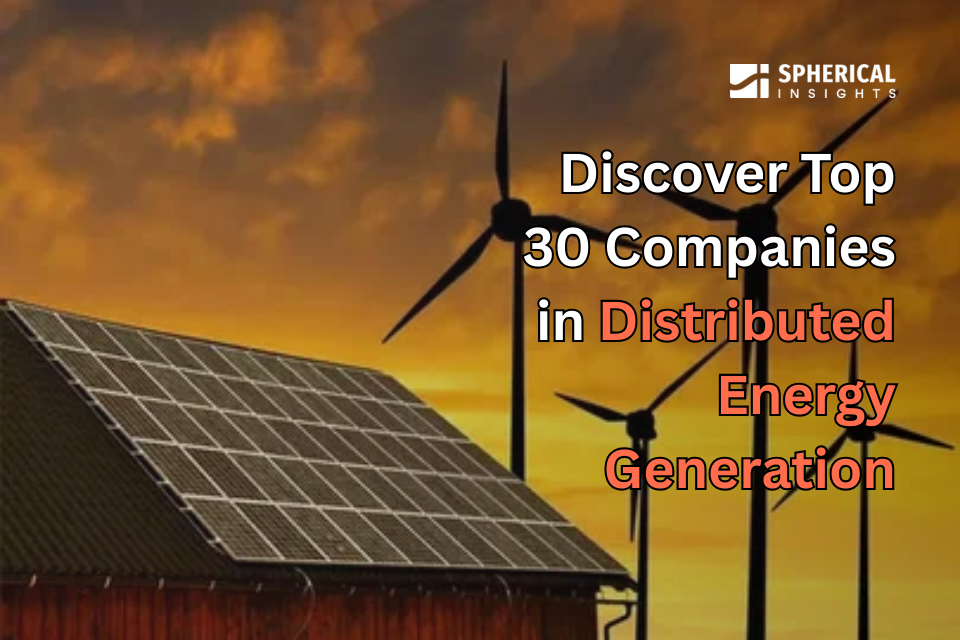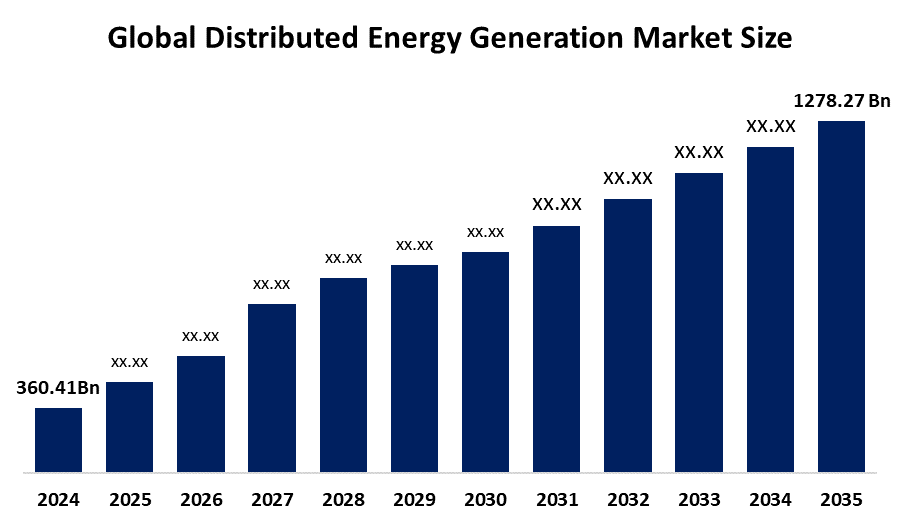
Discover Top 30 Companies in Distributed Energy Generation: Global Share, Market Size, Revenue Report (2024–2035)
RELEASE DATE: Aug 2025 Author: Spherical InsightsRequest Free Sample Speak to Analyst
Description
According to a research report published by Spherical Insights & Consulting, The Global Distributed Energy Generation Market Size is projected to Grow from USD 360.41 Billion in 2024 to USD 1278.27 Billion by 2035, at a CAGR of 12.2% during the forecast period 2025–2035. The distributed energy generation market is increasing due to rising demand for constant, clean power, growing adoption of renewables, grid-smart technologies, lowering the cost of energy, government support, and the requirement for access to energy in rural areas.
Introduction
The distributed energy generation (DEG) market refers to the use of decentralized generation of electricity using small scale technologies located near to point of consumption. DEG encompasses solar photovoltaics (PV), wind turbines, microturbines, fuel cells, biomass, and small hydro plants. The systems are becoming more prevalent in residential, commercial, and industrial applications to increase energy efficiency, limit transmission losses, and provide grid stability. Major drivers for markets are increasing global energy consumption, increasing awareness about climate change, and the necessity for efficient, low carbon power supplies. DEG also fosters access to energy in distant or underdeveloped areas. Strengths of the market are its adaptability, scalability, and ability to reduce electricity prices and carbon emissions. Opportunities are increasing with the increasing technology in energy storage and smart grid integration. In addition, growing investment in renewable energy and decentralized infrastructure is driving adoption. Government incentives and policies, tax benefits, feed-in tariffs, and net metering also aid market expansion. Countries worldwide are promoting DEG to increase energy security, lower reliance on fossil fuels, and create a more sustainable, resilient energy system for the future.
Navigate Future Markets with Confidence: Insights from Spherical Insights LLP
The insights presented in this blog are derived from comprehensive market research conducted by Spherical Insights LLP, a trusted advisory partner to leading global enterprises. Backed by in-depth data analysis, expert forecasting, and industry-specific intelligence, our reports empower decision-makers to identify strategic growth opportunities in fast-evolving sectors. Clients seeking detailed market segmentation, competitive landscapes, regional outlooks, and future investment trends will find immense value in the full report. By leveraging our research, businesses can make informed decisions, gain a competitive edge, and stay ahead in the transition toward sustainable and profitable solutions.
Unlock exclusive market insights - Download the Brochure now and dive deeper into the future of the Distributed Energy Generation Market.
Distributed Energy Generation Market Size & Statistics
- The Market Size for Distributed Energy Generation Was Estimated to be worth USD 360.41 Billion in 2024.
- The Market Size is Going to Expand at a CAGR of 12.2% between 2025 and 2035.
- The Global Distributed Energy Generation Market Size is anticipated to reach USD 1278.27 Billion by 2035.
- Asia Pacific is expected to generate the largest demand during the forecast period in the Distributed Energy Generation Market
- North America is expected to grow the fastest during the forecast period in the Distributed Energy Generation Market.

Regional growth and demand
North America is expected to grow the fastest during the forecast period in the distributed energy generation market. North America is anticipated to witness a rapid growth rate in the distributed energy generation market, with accelerating solar and wind installations. Encouraging government policies, renewable energy goals, and improved technology are fueling demand for decentralized energy solutions to drive sustainability and lower greenhouse gas emissions in the region.
Asia Pacific is expected to generate the largest demand during the forecast period in the distributed energy generation market. Asia Pacific led the distributed energy generation market based on high urbanization rates, growing electricity demand, and robust government policies supporting renewable energy sources in nations such as China, India, and Japan. Increased investments in smart grids, solar PV, and microgrid infrastructure also boosted the growth and leadership of the region's market.
Top 10 trends in the Distributed Energy Generation Market
- Smart grid & microgrid development
- Renewable energy dominance
- Fuel cell advancements
- Energy storage integration
- Rising adoption of solar photovoltaics (PV)
- Digitalization and data analytics
- Decentralization of energy systems
- Natural gas price volatility
- Growth in wind energy installations
- Industrial & commercial sector adoption
1. Smart grid & microgrid development
Smart grid and microgrid deployment represent a major distributed energy generation trend that provides effective energy distribution, real-time monitoring, and grid resilience. They facilitate decentralized power through the integration of renewable energy sources, energy flow management, and reliability during power outages, particularly in disaster-prone or remote locations, to improve energy independence and flexibility.
2. Renewable energy dominance
Renewable energy dominance is a major trend driving distributed energy generation, as solar, wind, and biomass offer clean, scalable, and locally sourced power solutions. Their growing affordability and sustainability make them ideal for decentralized systems, reducing reliance on fossil fuels and supporting global carbon reduction goals.
3. Fuel cell advancements
Advancements in fuel cells are accelerating distributed energy production through efficient, low-emission power solutions, particularly for commercial and industrial use. Improved durability and affordability, modern fuel cells enable decentralized power networks, offer backup power, and stabilize the grid while decreasing greenhouse gas emissions and the reliance on fossil fuels.
4. Energy storage integration
Integration of energy storage is crucial for distributed energy generation, providing a reliable power supply through saving excess renewable energy. It stabilizes demand and supply, improves grid stability, and provides uninterrupted electricity in case of failures, facilitating optimal utilization of clean energy and overall system flexibility and resilience.
5. Rising adoption of solar photovoltaics (PV)
Rising solar photovoltaics (PV) adoption fuels distributed energy generation with clean, efficient, and accessible electricity. Solar PV technology enables homes and companies to produce power locally, decrease dependence on central grids, save on energy expenses, and advance sustainability objectives through the integration of renewable energy.
Empower your strategic planning:
Stay informed with the latest industry insights and market trends to identify new opportunities and drive growth in the distributed energy generation market. To explore more in-depth trends, insights, and forecasts, please refer to our detailed report.
Top 15 Companies Leading the Distributed Energy Generation Market
- Siemens Energy
- Vestas Wind Systems A/S
- General Electric (GE)
- Mitsubishi Electric Corp.
- Schneider Electric
- Caterpillar
- Cummins
- NextEra Energy
- Capstone Turbine Corp.
- Bloom Energy
- Rolls-Royce PLC.
- ENERCON GmbH
- Suzlon Energy Ltd.
- FuelCell Energy
- Ballard Power Systems Inc.
1. Siemens Energy
Headquarters: Munich, Germany
Siemens Energy is a leading provider of distributed energy generation solutions with a concentration on decentralized energy offerings such as microgrids, smart grids, and energy storage systems. Siemens delivers innovative technologies that allow for the integration of renewable energy sources such as solar and wind into distributed systems. Their solutions enable grid reliability improvement, transmission loss reduction, and enablement of energy resilience, especially for remote or autonomous locations. Siemens Energy also offers software and automation technology solutions to improve energy management, ensuring efficient, sustainable, and scalable decentralized energy generation.
2. Vestas Wind Systems A/S
Headquarters: Aarhus, Denmark
Vestas Wind Systems A/S is the global leader provider of wind energy solutions that specialize in designing, manufacturing, installing, and servicing wind turbines for distributed energy generation. The company facilitates the shift to clean energy through supplying effective, scalable wind power solutions that are adaptable for distributed energy projects, both onshore and offshore. Vestas aims to maximize energy production while reducing environmental impact, allowing communities and businesses to tap sustainable wind energy. Its innovative turbine technology and services form a crucial part of increasing the use of renewable energy globally.
3. General Electric (GE)
Headquarters: Boston, Massachusetts, USA
General Electric (GE) is a leading global player in the distributed energy generation market, with a focus on solutions that include renewable energy, energy storage, and microgrid technologies. GE develops and produces sophisticated wind turbines, gas engines, and combined energy systems that enable decentralized power production. Their advances in smart grids and energy management systems maximize energy delivery, offering flexible and dependable solutions for both urban and rural settings. GE's dedication to sustainability and advanced technology makes it an integral force in moving toward clean, distributed energy systems.
4. Mitsubishi Electric Corp.
Headquarters: Tokyo, Japan
Mitsubishi Electric Corp. is a major player in the distributed energy generation industry, delivering innovative solutions for renewable energy integration, such as solar power, wind energy, and energy storage systems. The company develops and produces power electronics, smart grid technologies, and microgrid systems that maximize energy efficiency and grid stability. Mitsubishi Electric aims to facilitate decentralized energy production, improve transmission loss reduction, and encourage sustainable energy use. Their technology is an important pillar supporting energy resilience, especially in areas with increasing renewable energy adoption.
5. Schneider Electric
Headquarters: Rueil-Malmaison, France
Schneider Electric is the world leader in energy management and automation with a focus on distributed energy generation solutions. Schneider offers innovative technologies for microgrids, energy storage, and integration of renewable energy. Schneider Electric's solutions facilitate decentralized energy generation and smart grid management, promoting energy efficiency and sustainability. With a strong focus on digital transformation, its solutions maximize the use of energy, minimize costs, and optimize grid resilience, making them vital for the sustainable and decentralized energy future.
Are you ready to discover more about the distributed energy generation market?
The report provides an in-depth analysis of the leading companies operating in the global distributed energy generation market. It includes a comparative assessment based on their product portfolios, business overviews, geographical footprint, strategic initiatives, market segment share, and SWOT analysis. Each company is profiled using a standardized format that includes:
Company Profiles
- Siemens Energy
- Business Overview
- Company Snapshot
- Products Overview
- Company Market Share Analysis
- Company Coverage Portfolio
- Financial Analysis
- Recent Developments
- Merger and Acquisitions
- SWOT Analysis
- Vestas Wind Systems A/S
- General Electric (GE)
- Mitsubishi Electric Corp.
- Schneider Electric
- Caterpillar
- Cummins
- NextEra Energy
- Capstone Turbine Corp.
- Others.
Conclusion
The distributed energy generation (DEG) market includes decentralized electricity generation based on small-scale technologies such as solar, wind, and fuel cells. It is driven by rising energy demand, environmental concerns, and the requirement for efficient and green electricity. The market is aided by innovations in energy storage, smart grids, and renewable energy integration. Firms such as Siemens Energy, Vestas, GE, Mitsubishi Electric, and Schneider Electric lead in developing solutions that help ensure grid resilience, reduce transmission losses, and encourage sustainability through decentralized systems.
About the Spherical Insights & Consulting
Spherical Insights & Consulting is a market research and consulting firm which provides actionable market research study, quantitative forecasting and trends analysis provides forward-looking insight especially designed for decision makers and aids ROI.
Which is catering to different industry such as financial sectors, industrial sectors, government organizations, universities, non-profits and corporations. The company's mission is to work with businesses to achieve business objectives and maintain strategic improvements.
CONTACT US:
For More Information on Your Target Market, Please Contact Us Below:
Phone: +1 303 800 4326 (the U.S.)
Phone: +91 90289 24100 (APAC)
Email: inquiry@sphericalinsights.com, sales@sphericalinsights.com
Contact Us: https://www.sphericalinsights.com/contact-us
Need help to buy this report?